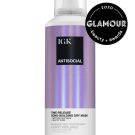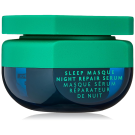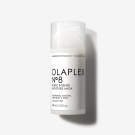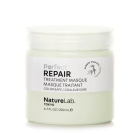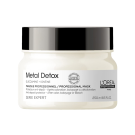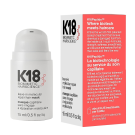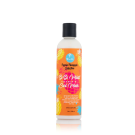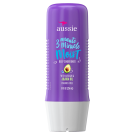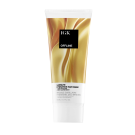
Top 10 Hair Masks For Dry Hair in 2023
What Is A Dry Hair Mask?
Hair masks are deep conditioning treatments that are designed to nourish and hydrate hair. They usually contain high concentrations of moisturizing ingredients such as oils and butters and are typically left on the hair for a period of time (often 20 minutes to an hour) before being washed out.
Most dry hair masks include the following ingredients:
- Oils: These are used for their moisturizing properties and are usually the key ingredients in hair masks. Commonly used oils include argan oil, coconut oil, jojoba oil, avocado oil, and olive oil.
- Butters: These also provide a high level of moisture. Commonly used butters include shea butter, mango butter, and cocoa butter.
- Proteins: These can help to strengthen and repair damaged hair. Commonly used proteins include hydrolyzed keratin, silk protein, and wheat protein.
- Vitamins and Minerals: These can help to nourish the hair. Commonly used vitamins and minerals include vitamin E, biotin, and zinc.
- Humectants: These are used to attract moisture to the hair. Common humectants include glycerin and aloe vera.
- Natural extracts: These are used for their various benefits to hair health. Examples include green tea extract, chamomile extract, and hibiscus extract.
- Surfactants: These are used to help spread the product evenly throughout the hair. Examples include cetyl alcohol and behentrimonium methosulfate.
- Preservatives: These are used to increase the shelf life
Dry hair masks are designed for convenience and continuous absorption of nutrients throughout the day or night. It’s recommended that you test on a small portion of your hair, before using on your entire head.
What Are The Benefits of Hair Masks For Dry Hair?
Dry hair masks, especially those formulated for dry and damaged hair, offer several benefits:
- Deep Conditioning: Hair masks are usually richer and more intensive than regular conditioners. They deeply nourish and condition the hair, making it softer and easier to manage.
- Moisturizing: Hair masks for dry hair are packed with hydrating ingredients like natural oils and butters, which replenish moisture to dry, brittle strands.
- Damage Repair: Ingredients like proteins can help to repair damage from things like heat styling, chemical treatments, and environmental stressors.
- Shine and Smoothness: By replenishing moisture and sealing the hair cuticle, hair masks can help to boost shine and reduce frizz.
- Strengthens Hair: Some hair masks contain proteins that help to strengthen the hair, reducing breakage and preventing future damage.
- Scalp Health: While primarily designed for hair, some masks also contain ingredients beneficial to the scalp, such as tea tree oil for its antimicrobial properties, or aloe vera for its soothing effects.
- Improved Hair Health Over Time: Regular use of a hair mask can improve the overall health and appearance of your hair over time.
Remember, it’s important to choose a dry hair mask that’s suitable for your hair type and concerns to see the best results. It’s also recommended to use hair masks sparingly, usually once a week or bi-weekly, as overuse can lead to product buildup or even protein overload if the mask contains a high amount of protein.
How We Graded The Best Dry Hair Masks
When evaluating dry hair masks we considered the following important factors:
- Ingredient Quality: Look at the ingredients list. The mask should contain a high concentration of moisturizing and nourishing ingredients, and fewer filler or potentially damaging ingredients like sulfates or alcohol. The presence of natural oils, vitamins, and proteins is a good sign.
- Effectiveness: Does the mask deliver on its promises? Does it moisturize and nourish the hair, make it feel softer, look shinier, and become more manageable? Does it help to repair damage and strengthen the hair?
- Ease of Use: Is the mask easy to apply? Does it spread easily throughout the hair? How long does it need to be left on the hair, and is this time frame convenient for you?
- Rinseability: Does the mask rinse out well, or does it leave a residue that makes the hair feel heavy or look greasy?
- Scent: While this is subjective, some people prefer hair products with a pleasant scent. Does the mask smell good to you? Is the scent too strong or too subtle?
- Value for Money: Consider the price of the mask relative to the size of the product and how long it lasts. Also consider the results it delivers for the price.
- Packaging: Is the packaging practical and environmentally friendly?
- Customer Reviews: Look at what other users have to say. Do they report positive results? Any common issues?
- Brand Reputation: Does the brand have a good reputation? Are they known for making high-quality hair products?
Remember to account for different hair types and needs, and to clarify that what works well for one person might not work as well for another due to these differences. In addition, as with all product tests, maintaining a level of objectivity is crucial, even when it comes to subjective aspects like scent or packaging.
Our Top 10 Recommended Dry Hair Masks
Frequently Asked Questions About Dry Hair Masks
What is a dry hair mask?
Hair masks are treatments that are formulated with oils, butters and other nourishing ingredients. These hydrating hair masks spend more time sinking into and nurturing hair than your average shampoo or conditioner, giving dramatic benefits in a single use.
What is the best hair mask for oily scalp and dry ends?
A dry hair mask such as IGK Hair’s Antisocial is a deep conditioning treatment that is designed to moisturize, nourish, and repair dry and damaged hair. It is usually applied to the hair, left on for a certain amount of time, and then rinsed out.
How often should I use a dry hair mask?
This can depend on the specific product and your hair type, but in general, most people can benefit from using a hair mask 1-2 times a week. If your hair is extremely dry or damaged, you may benefit from using it more frequently.
Can I leave a hair mask on overnight?
While some hair masks can be left on overnight for extra deep conditioning, it’s important to follow the instructions on the product’s packaging. Some masks might be too heavy and can cause product buildup if left on for too long.
Can a hair mask replace my regular conditioner?
A hair mask can provide deeper conditioning than a regular conditioner, but it’s not typically meant to be used as a replacement. Hair masks are used less frequently and are left on the hair for longer.
Do I apply a hair mask to wet or dry hair?
Most hair masks are meant to be applied to wet or damp hair after shampooing. However, some types of hair masks can be applied to dry hair. Always follow the instructions on the product’s packaging.
Can I use a hair mask on my scalp?
While hair masks are typically designed for the hair rather than the scalp, some can be beneficial for the scalp as well. However, be careful not to use a mask on the scalp if it contains heavy oils or ingredients that can cause buildup.
Will a hair mask help with hair growth?
While a hair mask may not directly stimulate hair growth, it can improve the overall health of your hair, preventing breakage and making your hair look fuller and longer.
Why does my hair feel hard or stiff after using a hair mask?
This could be a sign of protein overload, which can happen if a hair mask with a high concentration of protein is used too often. It could also be due to product buildup.
Can I use a hair mask on color-treated hair?
Yes, you can use a hair mask on color-treated hair. In fact, it can be beneficial as color treatments can dry out and damage the hair. However, make sure to use a mask that’s safe for color-treated hair to avoid fading the color.
What should I look for in a dry hair mask?
Look for a mask that contains moisturizing ingredients like natural oils and butters, as well as proteins for strength and repair. Avoid masks with harsh ingredients like sulfates or alcohol, which can dry out the hair.
About The Author…

Dr. Katie Belesney
COSMETIC DERMATOLOGIST & BEAUTY ENTHUSIAST
Dr. Katie Belesney is a licensed Cosmetic Dermatologist, beauty enthusiast, and holistic health coach who has a passion for helping men and women look their best. She loves writing and educating everyday people through her blog Beauty List Review.
